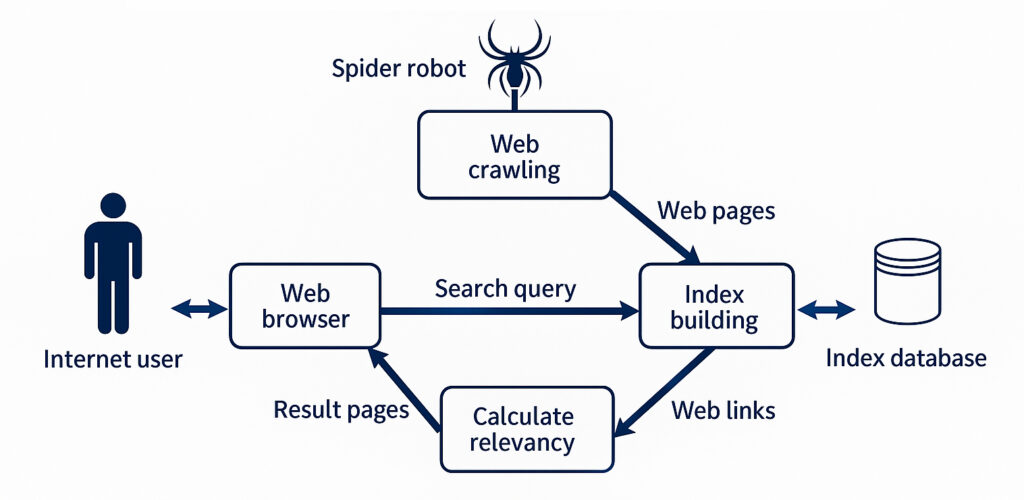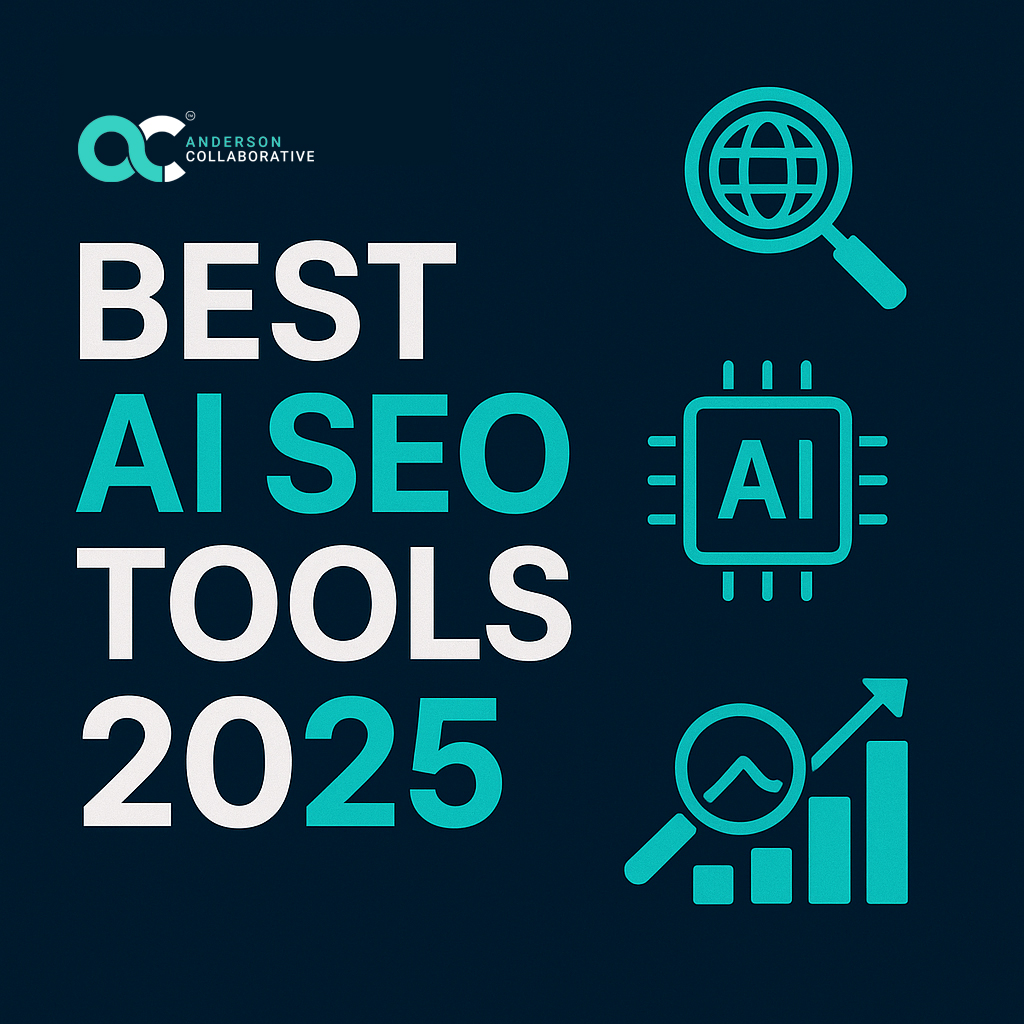Introduction: Why AI Search Is Rewriting the Rules of SEO
Search is no longer confined to ten blue links on a Google results page. In 2025, users are increasingly turning to AI-powered assistants like ChatGPT, Perplexity, Google Gemini, and Claude to get instant, synthesized responses.
This evolution in behavior marks a fundamental shift in how brands are discovered. Unlike traditional search engines, which surface results based on keyword relevance and backlinks, AI models deliver direct answers that often don’t include clickable URLs at all. Instead, they rely on deep language comprehension, semantic context, and trusted data to generate responses. That means if your brand isn’t showing up in those responses, you’re not just missing clicks—you’re missing the conversation entirely.
At Anderson Collaborative, we’ve helped our clients navigate this paradigm shift by pioneering strategies specifically tailored for large language models (LLMs). From restructuring on-page content to auditing brand presence across LLMs using a platform we helped create Rank Prompt, we understand what it takes to be visible in this new search ecosystem.
“In the age of generative search, visibility is no longer about page one rankings—it’s about being the answer.” — Anderson Collaborative
This guide will show you how to adapt your brand for maximum visibility across the most prominent AI search tools in 2025. Whether you’re a startup or an established brand, these insights will help you future-proof your discoverability.

What Is Traditional Search and How Does It Work?
To understand how AI search is transforming digital visibility, it helps to revisit the architecture of traditional search engines like Google and Bing. These platforms operate on a relatively straightforward—but rigid—process: crawling, indexing, ranking, and serving.
- Crawling: Search engine bots (also known as spiders) discover new and updated content across the web.
- Indexing: The discovered content is parsed, categorized, and stored in vast search engine databases.
- Ranking: When a user submits a query, algorithms assess the indexed content based on hundreds of ranking factors—keywords, backlinks, freshness, etc.
- Serving: The search engine returns a list of links it deems most relevant to the query, typically ranked in descending order of algorithmic confidence.
This model relies heavily on surface-level keyword relevance, link equity, and on-page technical structure. It rewards sites that conform to very specific SEO conventions, which made it easier for marketers to reverse-engineer visibility. But it also meant that the user’s true intent—especially in complex or nuanced queries—was often only partially satisfied.
“Search engines don’t really understand your content. They just try to match keywords and signals.” — Vishal Lingineni
Most importantly, traditional search is link-based. Discovery depends on whether your website URL is ranked and displayed. If your brand doesn’t claim one of the top ten spots, visibility plummets. As Lingineni notes, even Google’s sophisticated ranking systems ultimately depend on a page’s placement in the index—not on its semantic value or depth.
How AI Search and LLM-Based Discovery Works
Unlike traditional search engines that rely on indexed keywords and link hierarchies, AI-powered search tools use large language models (LLMs) to interpret queries and generate dynamic responses in real-time. These models don’t just retrieve—they compose answers by synthesizing knowledge from a wide array of sources.
Tools like ChatGPT, Perplexity, and Google Gemini use deep learning to understand both the intent and context of a user’s query. Instead of returning a list of links, they generate structured narratives or summaries that aim to directly answer the user’s question.
In practice, this means that your content needs to be understood, not just indexed. AI search relies on semantic relationships, entity recognition, factual alignment, and prompt relevance. Your brand may appear in a generated response not because of keyword density, but because the model has internalized your expertise and relevance from distributed content across the web.
“Generative Enginge Optimization requires focus on answering questions at a much deeper level with your content and setting it up in a way that is LLM friendly to retrieve.” — Nazareno Castro Bay
In the LLM era, visibility is less about ranking and more about representation: how clearly your brand is understood by these models. That requires a completely different optimization strategy.
Why AI Search Requires a Different Optimization Strategy
In the age of large language models, visibility isn’t about climbing to the top of a ranked list—it’s about becoming part of the model’s internalized knowledge. This fundamental shift breaks the traditional link-based discovery model and introduces entirely new parameters for discoverability.
LLMs like those used by ChatGPT and Gemini synthesize responses based on relationships, associations, and signals derived from training data, prompt history, and semantic relevance. That means a brand doesn’t need to be ranked #1 in Google to appear first in an AI-generated summary—but it does need to be contextually understood.
This leads to three key differences:
- No traditional rankings: LLMs don’t display a list of results; they return a single synthesized answer.
- Indirect sourcing: Many responses don’t cite URLs, making it harder to track visibility through tools like Google Search Console.
- Semantic matching: AI search favors conceptual relevance over exact keyword matches.
For a deeper dive into how LLMs enable this shift through semantic indexing, vector similarity, and contextual embeddings, see this comprehensive beginner’s guide to semantic search by SingleStore.
These changes mean your SEO strategy must evolve beyond keywords. To influence AI search visibility, you need to create prompt-friendly content, claim your entity presence across the web, and reinforce your brand narrative across structured and unstructured channels. We’ll show you how in the next section.
Visualization of how AI and GenAI search differs from traditional SEO. Source: BrightEdge
How to Optimize for AI Search: Actionable Strategies
Now that we’ve established how AI search diverges from traditional SEO, let’s break down the steps brands can take to improve their visibility within AI-generated responses. Unlike keyword-based strategies, AI SEO is about being semantically aligned, contextually useful, and structurally clear.
- Create Prompt-Friendly Content: Structure pages around questions your audience might ask AI tools (e.g., “What is the best eco-friendly container for meal prep?”). Use natural, direct language and provide concise, answer-ready summaries within each page.
- Add Structured Data: Use Schema.org markup to identify FAQ sections, product specs, reviews, and your organization’s identity. This helps LLMs contextualize your content.
- Establish Entity Consistency: Ensure your brand is defined and consistently described across platforms like Wikidata, LinkedIn, Crunchbase, and your website. This improves how language models recognize your entity.
- Reinforce Topical Authority: Build content clusters around primary topics. Interlink blog posts, landing pages, and case studies to strengthen your brand’s relevance in a domain.
- Use an AI Visibility Tracking Tool: Platforms like Rank Prompt allow you to see exactly how and when your brand appears in AI search tools like ChatGPT, Claude, and Perplexity.
These strategies are the foundation of Generative Engine Optimization (GEO)—the new discipline that helps brands influence AI-driven discovery. The faster you adopt these principles, the better positioned you’ll be in this rapidly evolving landscape.
Content Creation and Off-Page Signals That Influence LLM Visibility
To strengthen your brand’s presence in AI-generated results, you must go beyond on-page technical optimization. Language models respond strongly to the quality, clarity, and context of the content you publish—and also to how consistently your brand is discussed and referenced across the web.
High-Utility Content That Boosts LLM Recall
- Educational Blog Posts: Informational content that explains industry trends, tools, or tactics helps position your brand as an authority.
- Q&A and FAQ Pages: Structured, digestible answers increase your chances of being cited directly in AI responses.
- Comparison and Listicle Content: Posts like “Top 10…” or “X vs Y” help models understand the landscape of your industry and your brand’s positioning within it.
- Product Glossaries or Terminology Guides: Defining the language of your domain shows thought leadership and aids semantic indexing.
- Case Studies and Success Stories: Concrete examples of your brand in action build trust signals that LLMs interpret as proof of value.
Strengthening Off-Page Signals and Authority
LLMs pull from a wide array of content, including third-party platforms. Consistent brand mentions and positive associations across channels serve as critical off-page signals.
- Earned Backlinks from High-Trust Domains: Quality backlinks remain an indirect indicator of expertise and notability.
- Forum Engagement: Relevant discussions on Reddit, Quora, StackExchange, and niche forums are often indexed and synthesized by models like Perplexity and Claude.
- Guest Features and Digital PR: Contributing to authoritative industry blogs or podcasts expands your brand’s signal in diverse contexts.
- Directory and Profile Consistency: Ensure your brand information is up-to-date across Crunchbase, Google Business, LinkedIn, and G2.
Think of each digital mention as another vector of reinforcement: LLMs learn by patterns, not page rank. The more often and consistently your brand is associated with clear, helpful, well-structured information, the more likely it is to appear in AI-generated answers.
How to Track and Measure Your Brand’s AI Search Performance
Traditional SEO tools like Google Search Console or Ahrefs don’t measure visibility across platforms like ChatGPT, Claude, Gemini, or Perplexity. That’s because LLMs don’t rely on indexed web results—they generate answers based on learned language patterns, entity associations, and prompt structures. As a result, brands need new ways to monitor their AI visibility.
This is where platforms like Rank Prompt come in. Rank Prompt is built specifically to help marketers and SEO teams understand how large language models reference or mention their brand, products, or content in AI-driven answers.
What Rank Prompt Tracks
- Brand Mentions in ChatGPT, Claude, Perplexity, and Gemini
- Prompts where your brand is cited or suggested as an answer
- Comparative visibility vs competitors in AI-generated responses
- Entity comprehension issues (e.g. if your brand is misrepresented or misunderstood)
With these insights, you can refine your messaging, content structure, and authority-building strategy to improve your brand’s presence in conversational search environments.
“If you’re not auditing how AI talks about your brand, you’re flying blind in the future of search.” — Anderson Collaborative
We recommend running monthly visibility audits and tracking key prompts tied to your offerings or competitors. Over time, these metrics become your AI search equivalent of keyword rankings—and are critical for long-term brand salience.
AI Search Optimization Checklist (2025)
| Optimization Task | Priority |
|---|---|
| Add FAQ schema to major landing pages | ✅ High |
| Structure H2s as natural language user questions | ✅ High |
| Update organization schema with consistent brand data | ✅ High |
| Create blog posts that directly answer AI prompts | ✅ High |
| Ensure entity alignment across Wikidata, Crunchbase, and LinkedIn | ✅ Medium |
| Publish thought leadership articles or guest posts | ✅ Medium |
| Submit to directories and AI-indexed databases | ✅ Medium |
| Monitor brand mentions using Rank Prompt | ✅ High |
Bonus: Content Formats That Rank Well in AI Results
Some types of content consistently outperform others in AI-generated answers because of their utility, structure, and topical clarity. These formats tend to be easier for LLMs to summarize, cite, or paraphrase when generating helpful responses for users.
- Listicles: Numbered articles (e.g., “Top 10,” “Best Of”) provide digestible structure and semantic clarity. Example: 10 Best Wallet Brands for Men in 2025 — a featured client blog that ranks in multiple AI tools.
- FAQ-Driven Landing Pages: Clear answers to commonly asked questions boost extractability for generative models.
- Head-to-Head Comparisons: Posts like “Tool A vs Tool B” help models understand competitive positioning.
- Explainers and Definitions: Articles that clarify industry concepts are often cited when users ask LLMs to define terms.
- How-to Guides: Structured tutorials are excellent for step-by-step synthesis by AI engines.
- Case Studies: Real-world examples show practical value and are often used to support claims in generated answers.
When creating content for AI visibility, don’t just think about keywords—think about structure, purpose, and relevance. What would a user ask AI that your content can confidently and clearly answer?
Frequently Asked Questions About AI Search Optimization
What’s the difference between traditional SEO and AI search optimization?
Traditional SEO focuses on ranking pages in search engines based on signals like keywords, backlinks, and technical structure. AI search optimization focuses on making your brand and content discoverable by large language models (LLMs) like ChatGPT, which generate synthesized answers based on semantic understanding, not keyword rankings.
Do backlinks still matter for AI search?
Yes, but differently. Backlinks from high-authority sites help reinforce your brand’s credibility across the web, which contributes to how LLMs interpret trust and topical relevance—even if they don’t use PageRank-style metrics.
How can I tell if AI tools like ChatGPT or Claude mention my brand?
Use tools like Rank Prompt to track whether and how your brand appears in AI-generated answers. These tools simulate LLM queries and analyze response patterns to measure brand visibility across platforms.
What content should I prioritize for LLM visibility?
Start with FAQ pages, definition articles, how-to guides, and listicles that align with real user queries. Use conversational headers, clear structure, and semantic markup to help LLMs parse and reuse your content effectively.
Ready to Elevate Your Brand’s Visibility in AI Search?
The future of search is already here—and it’s powered by generative AI. If your brand isn’t being surfaced in ChatGPT, Perplexity, Claude, or Gemini, you’re missing the next wave of digital visibility.
At Anderson Collaborative, we help businesses adapt to this evolving landscape through strategic content planning, semantic SEO, and prompt-focused optimization. Whether you’re looking to audit your brand presence across AI tools or need a full roadmap for LLM discoverability, our team can help.
Don’t let your brand get left behind. Own the answers, not just the rankings.



